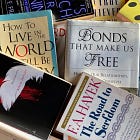When You’re Feeling Like Sisyphus, the Stoics Have the Antidote
How one conducts oneself is a theme the great Stoic philosophers continually considered.
My recent essay on Groundhog Day is a prologue to this essay.
Recently, when a friend asked me how I was doing, I was tempted to complain that I felt like Sisyphus pushing the proverbial boulder up the mountain each day, only to do the same thing again the next. Implicit in my ego’s unspoken reaction is that feeling burdened is evidence that I am victimized by life.
Of course, much of daily life is routine. No matter how much effort we make, we never get our boulder to rest permanently at the top of the mountain. Some days go better than others, but daily life contains disappointments.
Completing anything in the world will never ensure a permanent state of fulfillment. Nature (to use the Stoic term for the Wholeness we are all part of) is found in the present, not in our imagined future.
See my essay on Caitlin Clark for a further elaboration of these points.
Throughout our study of Meditations by Marcus Aurelius, we have come to understand that meaning in life can be found in each moment by acknowledging our power to choose our right mind over our wrong mind. Our ego (wrong mind) may want us to feel hopeless in a futile world, but that is not Reality.
The perennial philosophy, as found in Meditations, provides a better way to a meaningful life. We may not yet live fully this better way, but restoring our power of choice ends our sense of futility.
The evening of the same day of my conversation with a friend, my wife and I listened as RFK Jr. gave new meaning to the story of Sisyphus in the documentary The Real RFK Jr.
Weeks before his father's assassination, his father handed RFK Jr. a copy of The Plague by Camus and, with “intensity,” told him, “I want you to read this.”
The Stoic philosophers influenced Camus, and his novel explores a doctor facing a life-threatening plague, deciding whether he should take the risk to help others. He is terrified, doesn’t have any way to treat the plague, and the odds are high he will succumb to the plague himself. In RFK Jr.’s words, the doctor decides to help “because that's his duty.”
RFK Jr. explained why, for Camus, Sisyphus was not a tragic figure despite pushing a boulder up the hill only to have to do it all over again the next day: “Most people would say that's pretty awful; that's a bad sentence. But for the Stoics, Sisyphus was a happy man because he put his shoulder to the wheel, and he was doing his duty.”
Then RFK Jr. explored what he learned:
Whether the outcome was satisfactory or fulfilling was irrelevant. What's relevant is whether you're doing what you're supposed to do. That turned out to be a very important message for me and the way that I live my life, because it's not about outcomes, it's about how you process reality and how you handle it.
Exploring his belief in right conduct as the pathway to honor, RFK Jr. said: “The reality is that none of us have any power over anything except for this little piece of real estate inside of our own shoes; and the outcome for everything is ultimately in God's hands, except about how we conduct ourselves.”
RFK Jr. explored further the universal lessons of Sisyphus: “The trick to life is to not have expectations but just to know what your duty is. If you don't have expectations, you'll never have disappointments; and if you don't have disappointments, you're never going to get crushed.”
Anchored in our right mind, we don’t bend from principles despite the stones being thrown at us. RFK Jr. explained how the myth of Sisyphus helped develop that strength of character: “You become relentless; nobody can defeat you. Whether you win or lose is irrelevant. The only thing that's relevant is how you've conducted yourself in the battle.”
How one conducts oneself is a theme the great Stoic philosophers continually considered.
Epictetus advised: “Whatever rules of conduct are set for you, hold to them as if they were laws, as if it would be an act of impiety for you to transgress them; as to what anyone says about you, pay no heed to it, since in the end that is not your concern.”
Seneca wrote, “It is enough for me to subtract something from my vices each day and to chastise my own mistakes.”
And in Notebook 5.1 Marcus Aurelius advised himself: “I have work to do as a human being, and that’s why I’m getting up. Do I still resent it if I’m on my way to do the work for which I was born and for the sake of which I was brought into the world?”
We can take to heart the lesson of the Stoics: Each of us is responsible for playing our part with honor.
There is an old saying: how you do anything is how you do everything. In an interview with Lex Fridman, RFK Jr. explained how for him, “life was a series of tests. And there was a bunch of moral decisions that I had to make every day.” Like the Stoics, he recognized that tests are embedded in everyday life. He explained, “These were all just little things that I did. But each one now for me had a moral dimension”:
Like when the alarm goes off, do I lay in bed for an extra 10 minutes with my indolent thoughts; or do I jump right out of bed? Do I make my bed? Most important decision of the day.
Do I hang up the towels? When I go into the closet and pull out my blue jeans and a bunch of those wire hangers fall on the ground, do I shut the door and say, I’m too important to do that. That’s somebody else’s job, or not? And so, do I put the water in the ice tray before I put it in the freezer? Do I put the shopping cart back in the place that it’s supposed to go in the parking lot of the Safeway? And if I make a whole bunch of those choices… I maintain myself in a posture of surrender, which keeps me open to my higher power, to my God.
RFK Jr. learned to surrender. We didn’t create our right mind, but we can surrender to it.
Camus ended his essay “The Myth of Sisyphus” with these words:
We leave Sisyphus at the foot of the mountain! One always finds one’s burden again. But Sisyphus teaches the higher fidelity that negates the gods and raises rocks. He too concludes that all is well. This universe henceforth without a master seems to him neither sterile nor futile. Each atom of that stone, each mineral flake of that night-filled mountain, in itself forms a world. The struggle itself toward the heights is enough to fill a man’s heart. One must imagine Sisyphus happy. (emphasis added)
I have found Sisyphean themes but no explicit mention of Sisyphus in Stoic writings. As we will see, Marcus’s Notebook 12 reflects on several Sisyphean themes.
Of Camus’s thoughts on the struggles of Sisyphus, Marcus might say that happiness in pushing the boulder up the mountain comes from doing our duty with Nature as our guide. The momentary sense of futility I felt when a friend asked me how I was doing was telling me nothing about life; it was a sign I was in my wrong mind and I could choose again.
Despair is not the answer to life’s seeming futility; the answer is choosing our right mind.
Because of its ability to facilitate a mindset shift away from futility Man’s Search for Meaning by Viktor Frankl remains one of the most influential books of the 20th century. It is the next book after Meditations at Mindset Shifts U.
Your support for this Substack is received gratefully and makes these essays possible.







As always, thanks for your thought-provoking article. You have spurred some thoughts of my own..
Some things in our lives really are like Sisyphus' boulder. The boulders are unchosen duties/responsibilities or a life circumstance that we truly cannot change. For the boulders in our lives, yes, mentally struggling against the thing you have to do will only cause more suffering. The heroic choice is also the rational one.
My sense is that in the society that gave birth to Stoicism, there was very little personal freedom for most people. I imagine it was a much more rigidly hierarchical society where, based on the circumstance of their birth, people were simply expected to pursue those activities appropriate to their station in life. Since you were unlikely to be able to change your circumstances or influence society, you might as well get on with it and start pushing your boulder up the hill! Don't spend time worrying about the justice or morality of it, you can't change it - that's just Nature, so start pushing!
Maybe I'm just projecting my own issues here (ahem... yes!), but it seems like the bigger problem we have in modern life is dealing with the problem of freedom. For more affluent and liberal societies, the range of options for most people has expanded exponentially. Yes, there are still boulders, but for many people wishing to pursue virtue the great source of anxiety is how to choose among the many possible good directions in life? What tasks to purse? Which social problems to try to influence? What ways to try to make society better?
Stoicism wisely says we should let go of the things that are out of our control - and embrace the tasks that are required of us. But the freedom and possibilities for the individual in modern life demand an additional kind of wisdom and discernment -- how to choose which between good activities to pursue (and to what extent) and how to let go of all the rest. There were obvious natural limits of individual influence in ancient times, but today the challenge is to identify and make peace with our own limits.
Does Stoicism have anything to say on this problem? Virtue can be pursued in just about any arena... how do we choose which arenas to play in? Which problem to work on? Is there a hierarchy of responsibilities we have? How might we weight those? How do we choose?
Perfect timing Barry. In the middle of pushing that boulder up the mountain with a friend and client. This was a very helpful reminder to keep on keeping on. The process is the substance that nourishes in the present